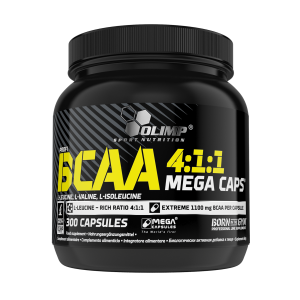FREE SHIPPING ON ORDERS OVER 50€
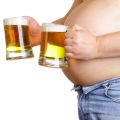 Alcohol makes you fat! ... This stereotype has become widespread in the popular consciousness.
What certainly contributed to this notion is the image of the Sarmatian drunkard, with a big belly overflowing the Slutsk belt and a large glass in his hand. However, intoxication was associated in the past centuries with wealth and lavish lifestyle, that is generally with indulging oneself in all things without any restraint – and with stuffing oneself and drinking a lot. But is alcohol fattening? ... The issue should actually be pondered over...
At some stage, alcohol uses the same metabolic pathways as sugars and fats, therefore, ...
Alcohol makes you fat! ... This stereotype has become widespread in the popular consciousness.
What certainly contributed to this notion is the image of the Sarmatian drunkard, with a big belly overflowing the Slutsk belt and a large glass in his hand. However, intoxication was associated in the past centuries with wealth and lavish lifestyle, that is generally with indulging oneself in all things without any restraint – and with stuffing oneself and drinking a lot. But is alcohol fattening? ... The issue should actually be pondered over...
At some stage, alcohol uses the same metabolic pathways as sugars and fats, therefore, ...
 BV 159
A simple interpretation of biological value (BV) of proteins is actually not an easy task! This particular measure of protein nutritional value, out of seven others, has become the favourite with manufacturers of sports supplements. They place it on the label – and you ask: what does it mean? I hope that today's attempt to clarify this issue will be clear and comprehensible! ...
The body of an average adult, healthy, male replaces ca. 140 g of protein each day. Proteins control all life processes, and as a result of their activity they wear out and must be replaced. In ...
BV 159
A simple interpretation of biological value (BV) of proteins is actually not an easy task! This particular measure of protein nutritional value, out of seven others, has become the favourite with manufacturers of sports supplements. They place it on the label – and you ask: what does it mean? I hope that today's attempt to clarify this issue will be clear and comprehensible! ...
The body of an average adult, healthy, male replaces ca. 140 g of protein each day. Proteins control all life processes, and as a result of their activity they wear out and must be replaced. In ...
 Every athlete training both competitively and recreationally must pay attention to what they eat, as it has a direct bearing on their sports results. One of the most important aspects of nutrition in sport is the fulfilment of energy needs, most of which are covered at the expense of burning two energy compounds: carbohydrates and fats. The greater the intensity of muscle work, the more sugars are burned. The body has the capacity to accumulate them in the form of muscle glycogen. Since this process is most intensive in the first few hours after a workout, it is important that ...
Every athlete training both competitively and recreationally must pay attention to what they eat, as it has a direct bearing on their sports results. One of the most important aspects of nutrition in sport is the fulfilment of energy needs, most of which are covered at the expense of burning two energy compounds: carbohydrates and fats. The greater the intensity of muscle work, the more sugars are burned. The body has the capacity to accumulate them in the form of muscle glycogen. Since this process is most intensive in the first few hours after a workout, it is important that ...
 General principles
An appropriate diet is one of the most important factors facilitating sports and health training. It is assumed that the diet of people who are physically active should not deviate in its composition from the typical one, yet meet the increased energy and nutritional demands of the body. This applies to both athletes and those practicing amateur or recreational sports.
Any strenuous exercise causes the organism to leave the state of equilibrium (homeostasis). Effective dietary regeneration not only ensures a rapid return to the normal state, but is also a prerequisite for increasing the fitness level. Adequate nutritional strategy is ...
General principles
An appropriate diet is one of the most important factors facilitating sports and health training. It is assumed that the diet of people who are physically active should not deviate in its composition from the typical one, yet meet the increased energy and nutritional demands of the body. This applies to both athletes and those practicing amateur or recreational sports.
Any strenuous exercise causes the organism to leave the state of equilibrium (homeostasis). Effective dietary regeneration not only ensures a rapid return to the normal state, but is also a prerequisite for increasing the fitness level. Adequate nutritional strategy is ...
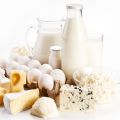 PROTEIN
As we know, physical activity, particularly in competitive athletes, increases the body's demand for energy and a range of nutrients necessary for its proper functioning.
An optimally designed diet should ensure, among other things, an adequate supply of proteins – necessary for maintaining levelled or positive nitrogen balance ensuring the preservation of or increase in muscle mass. Proteins are valuable building blocks of nervous and glandular tissue, they are components of body fluids and secretions, such as blood, enzymes and hormones, as well as contribute to important regulatory and transport processes.
As a consequence of hard muscle work we have to deal ...
PROTEIN
As we know, physical activity, particularly in competitive athletes, increases the body's demand for energy and a range of nutrients necessary for its proper functioning.
An optimally designed diet should ensure, among other things, an adequate supply of proteins – necessary for maintaining levelled or positive nitrogen balance ensuring the preservation of or increase in muscle mass. Proteins are valuable building blocks of nervous and glandular tissue, they are components of body fluids and secretions, such as blood, enzymes and hormones, as well as contribute to important regulatory and transport processes.
As a consequence of hard muscle work we have to deal ...
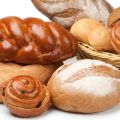 CARBOHYDRATES
Physical endurance of an athlete depends primarily on the size of energy resources accumulated in the body. In the period of frequent and lengthy training sessions, attention should be paid to ensuring that the dietary components serving as energy source are rapidly digested by the body, absorbed and burned, and that their surplus is effectively stored in the form of readily available reserves. Of all the energy nutrients supplied in the diet, it is only carbohydrates that meet the above criteria, therefore their presence in the diet of a sportsperson is particularly important.
The human body has the ability to store ...
CARBOHYDRATES
Physical endurance of an athlete depends primarily on the size of energy resources accumulated in the body. In the period of frequent and lengthy training sessions, attention should be paid to ensuring that the dietary components serving as energy source are rapidly digested by the body, absorbed and burned, and that their surplus is effectively stored in the form of readily available reserves. Of all the energy nutrients supplied in the diet, it is only carbohydrates that meet the above criteria, therefore their presence in the diet of a sportsperson is particularly important.
The human body has the ability to store ...
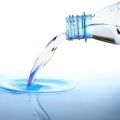 WATER AND ELECTROLYTES
With increased physical activity, the body is depleted of a considerable amount of water and electrolytes, which can impair the proper regeneration process, reduce the work efficiency and cause health complications. In normal surroundings, a person loses approximately 25 ml to 50 ml of water per hour, but with increased physical activity these losses may reach 2-3 l/h and cause a capacity decrease by up to 30%. Such a significant loss of water results mainly from the ongoing thermoregulation processes. During muscle work, when the rate of burning the energy components (carbohydrates and fatty acids) intensifies, the body ...
WATER AND ELECTROLYTES
With increased physical activity, the body is depleted of a considerable amount of water and electrolytes, which can impair the proper regeneration process, reduce the work efficiency and cause health complications. In normal surroundings, a person loses approximately 25 ml to 50 ml of water per hour, but with increased physical activity these losses may reach 2-3 l/h and cause a capacity decrease by up to 30%. Such a significant loss of water results mainly from the ongoing thermoregulation processes. During muscle work, when the rate of burning the energy components (carbohydrates and fatty acids) intensifies, the body ...
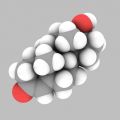 As testosterone is the most important male sex hormone, affecting positively the development of muscles, libido and quality of life in men, the search continues for different methods conducive to the establishment of its high level in the body. In addition to the synthesis of ever new forms or analogues of this compound, serving to replenish it, another direction in research procedure aims at identifying herbs and food produce, as well as their active substances, stimulating the synthesis and elevating the levels of testosterone. Researchers have not omitted fats here – the universal foodstuff present on our table. And what ...
As testosterone is the most important male sex hormone, affecting positively the development of muscles, libido and quality of life in men, the search continues for different methods conducive to the establishment of its high level in the body. In addition to the synthesis of ever new forms or analogues of this compound, serving to replenish it, another direction in research procedure aims at identifying herbs and food produce, as well as their active substances, stimulating the synthesis and elevating the levels of testosterone. Researchers have not omitted fats here – the universal foodstuff present on our table. And what ...
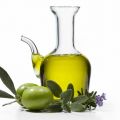 For a long time now, olive oil has been considered one of the most valuable food products a person can (and should) incorporate into their diet. Often, you can read about its protective role on our cardiovascular system and prevention against diseases associated with it. Personally, however, this is the first time I read reports, presented by the scientists from the University of Monastir (Tunisia) in association with colleagues from the King Saud University in Riyadh (Saudi Arabia), claiming that olive oil can protect against the damage caused by reactive forms of oxygen.
For 4 weeks, researchers had been giving ...
For a long time now, olive oil has been considered one of the most valuable food products a person can (and should) incorporate into their diet. Often, you can read about its protective role on our cardiovascular system and prevention against diseases associated with it. Personally, however, this is the first time I read reports, presented by the scientists from the University of Monastir (Tunisia) in association with colleagues from the King Saud University in Riyadh (Saudi Arabia), claiming that olive oil can protect against the damage caused by reactive forms of oxygen.
For 4 weeks, researchers had been giving ...
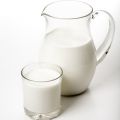 There is an opinion circulating among the bodybuilders that milk (and more broadly: dairy products) is not conducive to losing body fat. I am not entirely convinced of this notion, so let us look at what is in milk and see if we can identify possible culprits.
100 g of milk contains approximately:
3.3 g of protein (as a reminder: milk proteins can be divided into two factions – casein – 80% and whey – 20%)
4.8 g carbohydrates (lactose, otherwise known as milk sugar is a disaccharide built from simple sugars, galactose and glucose, in equal amounts)
different amounts of fat. Depending on ...
There is an opinion circulating among the bodybuilders that milk (and more broadly: dairy products) is not conducive to losing body fat. I am not entirely convinced of this notion, so let us look at what is in milk and see if we can identify possible culprits.
100 g of milk contains approximately:
3.3 g of protein (as a reminder: milk proteins can be divided into two factions – casein – 80% and whey – 20%)
4.8 g carbohydrates (lactose, otherwise known as milk sugar is a disaccharide built from simple sugars, galactose and glucose, in equal amounts)
different amounts of fat. Depending on ...
